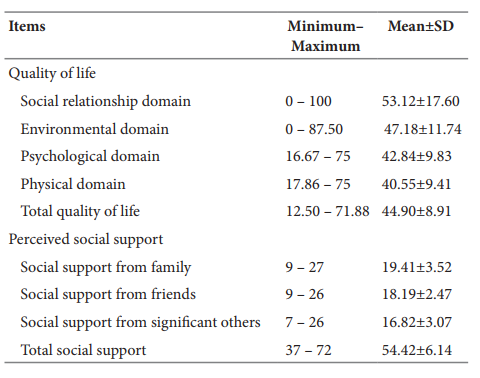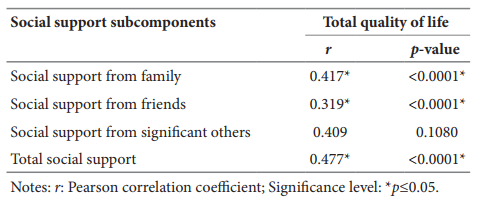
Introduction
The global population of elderly individuals has been steadily increasing, attributed to advancements in healthcare and longevity. In India, the elderly demographic (people aged 60 years and beyond) has notably expanded, from 92 million people in 2007 to 104 million people in 2011. Furthermore, the projections indicate a significant rise to 330 million elderly people in India by 2050. Aging brings about biological changes and social challenges, including diminishing social connections and increased dependency. Quality of Life (QOL) plays an important role in the measurement of well-being, encompassing various dimensions such as physical, mental, and social aspects. A study from Siwan district of Bihar (India), highlights the impact of social support on the QOL of elderly population.
Understanding QOL in the Elderly
QOL is a multifaceted concept that reflects an individual’s overall well-being, encompassing happiness, physical health, social interactions, and mental wellness. World Health Organization Quality of Life Scale-BREF (WHOQOL-BREF) scale evaluates QOL based on four domains: physical, psychological, social, and environmental. The elderly face unique challenges, including the prevalence of chronic diseases that impact their QOL significantly. Social support, comprising emotional and instrumental assistance from family, friends, and significant others, plays a crucial role in enhancing the QOL of older adults.
The results in Figure 1 shows that the social relationship domain had the highest mean score of 53.12 ± 17.60, whereas the physical domain had the lowest mean score of 40.55 ± 9.41. This result indicates that elderly people were affected most by the physical health and functioning, however they felt relatively satisfied with their social interactions and relationships.

Impact of Social Support on Quality of Life
Research consistently demonstrates the positive correlation between social support and QOL among the elderly. Strong social networks and supportive family members contribute significantly to improving QOL, even in the presence of health challenges. Social support acts as a buffer against life stressors, fostering resilience and coping mechanisms. The absence of social support can lead to feelings of loneliness and negatively impact both physical and emotional well-being.
Findings and Implications
Studies reveal that elderly individuals perceive the highest social support from their families, with a mean score of 19.41 ± 3.52 on Multidimensional Scale of Perceived Social Support (MSPSS), highlighting the importance of familial bonds. Enhancing social support networks is crucial for improving the QOL of older adults. Policy attention and effective health promotion measures are necessary to address the lower QOL associated with physical health among the elderly. Strengthening social support systems and providing gerontological counselling can significantly enhance the overall well-being of elderly populations.

The analysis in Figure 2 shows a significant positive correlation between QOL and MSPSS among elderly participants. Notably, support from family (r = 0.417, p < 0.0001) and friends (r = 0.319, p < 0.0001) significantly enhances QOL. Overall, higher perceived social support is linked to better QOL (r = 0.477; p < 0.0001), confirming the study’s hypothesis.
Conclusion
In conclusion, social support emerges as a vital factor influencing the QOL of the elderly. This study highlights the need to focus on enhancing social support structures to improve the well-being of older individuals. By recognising the significance of social connections and family support, communities can create a more supportive environment for the elderly, ultimately enhancing their quality of life and overall health.
